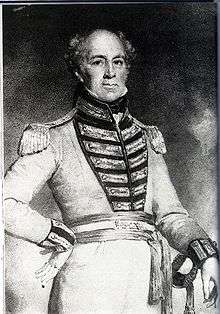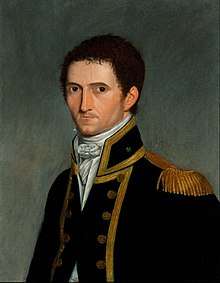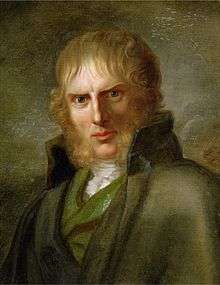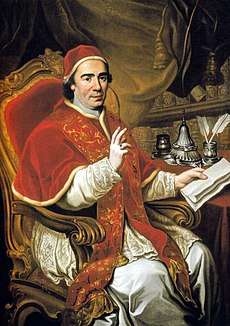1774
1774 (MDCCLXXIV) was a common year starting on Saturday of the Gregorian calendar and a common year starting on Wednesday of the Julian calendar, the 1774th year of the Common Era (CE) and Anno Domini (AD) designations, the 774th year of the 2nd millennium, the 74th year of the 18th century, and the 5th year of the 1770s decade. As of the start of 1774, the Gregorian calendar was 11 days ahead of the Julian calendar, which remained in localized use until 1923.
| Millennium: | 2nd millennium |
|---|---|
| Centuries: | |
| Decades: | |
| Years: |
| 1774 by topic |
|---|
| Arts and science |
|
| Countries |
| Lists of leaders |
| Birth and death categories |
|
| Establishments and disestablishments categories |
|
| Works category |
|
| Gregorian calendar | 1774 MDCCLXXIV |
| Ab urbe condita | 2527 |
| Armenian calendar | 1223 ԹՎ ՌՄԻԳ |
| Assyrian calendar | 6524 |
| Balinese saka calendar | 1695–1696 |
| Bengali calendar | 1181 |
| Berber calendar | 2724 |
| British Regnal year | 14 Geo. 3 – 15 Geo. 3 |
| Buddhist calendar | 2318 |
| Burmese calendar | 1136 |
| Byzantine calendar | 7282–7283 |
| Chinese calendar | 癸巳年 (Water Snake) 4470 or 4410 — to — 甲午年 (Wood Horse) 4471 or 4411 |
| Coptic calendar | 1490–1491 |
| Discordian calendar | 2940 |
| Ethiopian calendar | 1766–1767 |
| Hebrew calendar | 5534–5535 |
| Hindu calendars | |
| - Vikram Samvat | 1830–1831 |
| - Shaka Samvat | 1695–1696 |
| - Kali Yuga | 4874–4875 |
| Holocene calendar | 11774 |
| Igbo calendar | 774–775 |
| Iranian calendar | 1152–1153 |
| Islamic calendar | 1187–1188 |
| Japanese calendar | An'ei 3 (安永3年) |
| Javanese calendar | 1699–1700 |
| Julian calendar | Gregorian minus 11 days |
| Korean calendar | 4107 |
| Minguo calendar | 138 before ROC 民前138年 |
| Nanakshahi calendar | 306 |
| Thai solar calendar | 2316–2317 |
| Tibetan calendar | 阴水蛇年 (female Water-Snake) 1900 or 1519 or 747 — to — 阳木马年 (male Wood-Horse) 1901 or 1520 or 748 |
| Wikimedia Commons has media related to 1774. |
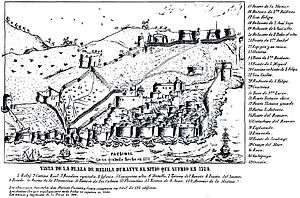
December 9: Start of the two month long Siege of Melilla
Events
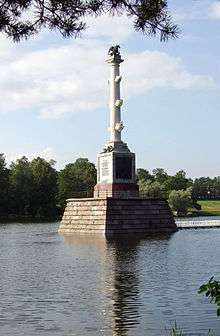
Chesma Column in Tsarskoe Selo, commemorating the end of the Russo-Turkish War.
January–March
- January 21 – Mustafa III, Sultan of the Ottoman Empire, dies and is succeeded by his brother Abdul Hamid I.[1]
- January 27 – An angry crowd in Boston, Massachusetts seizes, tars and feathers British customs collector and Loyalist John Malcolm, for striking a boy and a shoemaker, George Hewes, with his cane.
- February 3 – The Privy Council of Great Britain, as advisors to King George III, votes for the King's abolition of free land grants of North American lands. Henceforward, land is to be sold at auction to the highest bidder.[2]
- February 6 – France's Parliament votes a sentence of civil degradation, depriving Pierre Beaumarchais of all rights and duties of citizenship.[3]
- February 7 – The volunteer fire company of Trenton, New Jersey, predecessor to the paid Trenton Fire Department created in 1892, is founded. In 1905, at 131 years, it claims to be the oldest continuously serving department in the U.S.[4]
- February 24 – The Province of Massachusetts Bay House of Representatives votes, 92 to 8, to impeach Superior Court Chief Justice Peter Oliver, but Provincial Governor Thomas Hutchinson refuses to allow the trial to proceed.[5]
- March 10 – The Boston Journal makes the first reference to the "Stars and Stripes" flag to symbolize the American colonies, reporting that "The American ensign now sparkles a door which shall shortly flame from the skies."[6]
- March 31 – Intolerable Acts: The British Parliament passes the Boston Port Act, closing the port of Boston, Massachusetts as punishment for the Boston Tea Party.[6]
April–June
- April 17 – The first avowedly Unitarian congregation, Essex Street Chapel, is founded in London by Theophilus Lindsey.
- April 19 – The premiere of Iphigénie en Aulide by Christoph Willibald Gluck sparked a huge controversy, almost a war, such as has not been seen in Paris since the Querelle des Bouffons.
- May 10 – Louis XVI becomes King of France, following the death of his grandfather, Louis XV.[7]
- May 17 – The colony of Rhode Island and Providence Plantations issues the first call for an "Intercolonial Congress" that eventually is set up as the Continental Congress.[6]
- May 19 – Shakers Ann Lee and eight followers sail from Liverpool, England for colonial America.
- June 2 – Intolerable Acts: A new Quartering Act, requiring American colonists to provide better housing for British soldiers upon demand, is passed.[6]
- June 16–17 – English explorer James Cook becomes the first European to sight (and name) Palmerston Island in the South Pacific Ocean.
- June 20 (June 9 O.S.) – Russo-Turkish War (1768–1774): Battle of Kozludzha – The Imperial Russian Army, led by Alexander Suvorov, routs numerically superior Ottoman Empire forces.
- June 22 – The Parliament of Great Britain passes the Quebec Act, setting out rules of governance for the colony of Quebec in British North America, enlarging its territory as far south as Ohio[6] and granting freedom of religion for Roman Catholics.
July–September
- July 21 – Russia and the Ottoman Empire sign the Treaty of Küçük Kaynarca with Russian victory, ending six years of war. The treaty gives Russia the right to intervene in Ottoman politics, to protect its Christian subjects.
- August 1 – The element oxygen is discovered for the third (and last) time – the second quantitatively, following the somewhat earlier work of Carl Wilhelm Scheele (1771–1772) by Joseph Priestley, who publishes the fact in 1775, and so names the element (and usually gets all the credit, because his work was published first).
- August 6 – Ann Lee and the Shakers arrive in America and settle in New York.[6]
- September 1 – Powder Alarm: Thomas Gage, royal governor of the Province of Massachusetts Bay, orders British soldiers to remove gunpowder from a magazine, causing Patriots to prepare for war.
- September 4 – English explorer James Cook becomes the first European to sight (and name) the island of New Caledonia in Melanesia.
- September 5 – The First Continental Congress assembles in Philadelphia.[6]
- September 15 – Yemelyan Pugachev, leader of Pugachev's Rebellion against Russia by the Yaik Cossacks, is betrayed by his own men after returning to Yaitsk (now Oral, Kazakhstan).[8]
- September 21 – George Mason and George Washington found the Fairfax County Militia Association, a military unit independent of British control.
- September 29 – Johann Wolfgang von Goethe's semi-autobiographical epistolary novel The Sorrows of Young Werther (Die Leiden des jungen Werthers) (written January–March) is published anonymously in Leipzig, Germany; it is influential in the Sturm und Drang movement and Romanticism.
October–December
- October 10
- Dunmore's War – Battle of Point Pleasant: Cornstalk is forced to make peace with Dunmore at the Treaty of Camp Charlotte, ceding Shawnee land claims south of the Ohio (modern Kentucky) to Virginia.
- English explorer James Cook becomes the first European to sight (and name) Norfolk Island in the Pacific Ocean, uninhabited at this date.
- October 14 – The Continental Congress in America adopts the first "Declaration of Rights", with 10 principles.[6]
- October 20 – Theater performances in the American colonies halt on recommendation of the Continental Congress that the member colonies "discountenance and discourage all horse racing and all kinds of gaming, cock fighting, exhibitions of shows, plays, and other expensive diversions and entertainments."[6]
- October 21 – The word Liberty is first displayed on a flag raised by colonists in Taunton, Massachusetts, in defiance of British rule in Colonial America.
- October 25 – The Edenton Tea Party takes place in North Carolina, marking the first major gathering of women in support of the American cause.
- October 26 – The first Continental Congress adjourns in Philadelphia.
- November 4 – The Maryland Jockey Club follows a recommendation of the Continental Congress and cancels its race schedule. The decision sets a precedent for other jockey clubs in the colonies, and no major races are held until the end of the American Revolution.[9]
- November 10 – 1774 British general election: Voting for the House of Commons concludes in Great Britain, and Lord North retains the office of Prime Minister as his Tory coalition wins 343 of the 558 seats. Henry Seymour Conway's Whig Party wins the other 215 seats.
- November 15 – The government of the Republic of Venice allows adventurer and ladies' man Giacomo Casanova to return home after a 17-year absence.[10]
- November 20 – Daniel Boone retires from the Virginia colonial militia in order to devote his full time to establishing a settlement in Kentucky.[11]
- November 25 – Salawat Yulayev, the leader of the Bashkirs rebellion against the Russian government, is captured, bringing an end to the insurrection.[12]
- November 26 – English chemist Joseph Priestley becomes the first person to discover and identify sulfur dioxide.[13]
- November 27 – Spanish Navy Captain Domingo de Bonechea arrives at Tahiti in the ship Aguila and tries unsuccessfully to claim it for Spain and to convert the Tahitians to the Roman Catholic faith.[14]
- November 30
- Parliament adjourns in Great Britain, but declines to authorize any action against the rebellious American colonies, despite an address the day before by King George III and Prime Minister North.[15]
- Thomas Paine, a native of England, arrives in America at the age 37 and soon becomes an influential advocate for the colonies' independence.[16]
- December 1 – A boycott called by the Continental Congress goes into effect, as participating merchants and supporters cease the importation or consumption of products from Great Britain, Ireland or the British West Indies.[17]
- December 6 – Archduchess Maria Theresa, the ruler of Austria, Hungary and Croatia, signs the General School Ordinance providing for education for both males and females and setting compulsory education for children aged six through 12.[18]
- December 9 – The two month long Siege of Melilla begins as armies led by the Sultan of Morocco, Mohammed ben Abdallah, attack the North African Spanish colony of Melilla (which remains a part of Spain into the 21st century).[19]
- December 23 – King Louis XVI of France issues a declaration that, for the first time, protects "the free commerce of meat during Lent" to support the needs of "the poor whose infirmity requires them to eat meat."[20]
Date unknown
- To avoid severe flooding, Martinsborough, North Carolina is moved to higher ground 3 miles (4.8 km) west. The North Carolina General Assembly incorporates Martinsborough as the new seat of Pitt County, 3 years after its founding.
- German cobbler Johann Birkenstock creates the first Birkenstock sandals.
- A revision of the laws of cricket introduces a leg before wicket rule.
Births
- February 11
- Hans Järta, Swedish political activist, administrator (d. 1847)
- Maxim Gauci, Maltese lithographer (d. 1854)
- February 24 – Prince Adolphus, Duke of Cambridge (d. 1850)
- February 26 – William Farquhar, first British Resident and Commandant of colonial Singapore (d. 1839)
- March 9 – Mayhew Folger, American whaler, captain of Topaz, rediscovered Pitcairn Islands in 1808 (d. 1828)
- March 16 – Captain Matthew Flinders, English explorer (d. 1814)
- April 21 – Jean-Baptiste Biot, French physicist, astronomer and mathematician (d.1862)
- April 24 – Jean Marc Gaspard Itard, French physician (d. 1838)
- April 28 – Francis Baily, English astronomer (d. 1844)
- May 27 – Francis Beaufort, Irish hydrographer (d. 1857)
- June 21 – Daniel D. Tompkins, 6th Vice President of the United States (d. 1825)
- July 20 – Auguste de Marmont, French marshal (d. 1852)
- August 12 – Robert Southey, English poet and biographer (d. 1843)
- August 18 – Meriwether Lewis, American explorer, soldier and public administrator (d. 1809)
- August 28 – Elizabeth Ann Seton, co-founder of Mount St. Mary's University in the United States, founder of the Sisters of Charity (d. 1821)
- September 5 – Caspar David Friedrich, German artist (d. 1840)
- September 8 – Anne Catherine Emmerich, German Augustinian Canoness, mystic, Marian visionary, ecstatic and stigmatist (d. 1824)
- September 19 – Giuseppe Caspar Mezzofanti, Italian cardinal, linguist (d. 1849)
- September 26 – Johnny Appleseed (John Chapman), American nurseryman and Swedenborgian missionary, plants apple tree nurseries in Ohio, Indiana and Illinois (d. 1847)
- December 2 – François-André Baudin, French admiral (d. 1842)
- December 12 – William Henry, English chemist (d. 1836)
- date unknown – Sergey Glinka, Russian author, brother of Fyodor Glinka (d. 1847)
Deaths
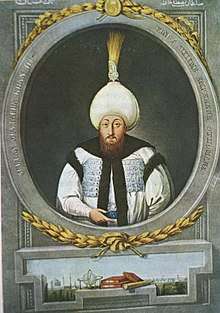
Sultan Mustafa III

King Louis XV of France
- January 9 – Józef Andrzej Załuski, Polish bishop (b. 1702)
- January 18 – Louis de Brienne de Conflans d'Armentières, French general (b. 1711)
- January 21 – Mustafa III, Ottoman Sultan (b. 1717)
- January 30 – František Tůma, Czech composer (b. 1704)
- February 4 – Charles Marie de La Condamine, French mathematician, geographer (b. 1701)
- February 10 – Florian Leopold Gassmann, German composer (b. 1729)
- March 30 – Countess Palatine Caroline of Zweibrücken (b. 1721)
- April 4 – Oliver Goldsmith, Irish writer (b. 1728)
- April 23 – Christian Wilhelm Ernst Dietrich, German artist (b. 1712)
- April 24 – Sara Banzet, French educator, diarist (b. 1745)
- May 4 – Duke Anthony Ulrich of Brunswick, Russian general (b. 1714)
- May 10 – King Louis XV of France (b. 1710)
- May 17 – Jeremiah Theus, American artist (b. 1716)
- June 24 – Thomas Amory (tutor), English tutor/minister/poet (b. 1701)
- July 1 – Henry Fox, 1st Baron Holland, English statesman (b. 1705)
- July 9 – Anna Morandi Manzolini, internationally known Italian anatomist and anatomical wax modeler (b. 1714)
- July 11 – Sir William Johnson, 1st Baronet, Irish-born New York pioneer (b. 1715)
- July 14 – James O'Hara, 2nd Baron Tyrawley, British field marshal (b. 1682)
- August 11 – Charles-François Tiphaigne de la Roche, French writer (b. 1722)
- August 14 – Johann Jakob Reiske, German scholar, physician (b. 1716)
- August 25 – Niccolò Jommelli, Italian composer (b. 1714)
- September 22 – Pope Clement XIV (b. 1705)
- September 25 – John Bradstreet, Canadian-born soldier (b. 1714)
- October 16 – Robert Fergusson, Scottish poet (b. 1750)
- October 23 – Michel Benoist, French Jesuit missionary, scientist (b. 1715)
- October 26 – Roemer Vlacq II, Dutch vice-admiral (b. 1712)
- November 22 – Robert Clive, British general, statesman (b. 1725)
- November 25 – Henry Baker, English naturalist (b. 1698)
- December 2 – Johann Friedrich Agricola, German composer (b. 1720)
- December 16 – François Quesnay, French economist (b. 1694)
- date unknown
- Martinez de Pasqually, French freemason
- Margaret Calderwood, British diarist (b. 1715)
- Catherine Michelle de Maisonneuve, French writer and publisher
References
- "Historical Events for Year 1774 | OnThisDay.com". Historyorb.com. Retrieved April 5, 2017.
- Woody Holton, Forced Founders: Indians, Debtors, Slaves, and the Making of the American Revolution in Virginia (University of North Carolina Press Books, 2011) p32
- "Beaumarchais", in The Cornhill Magazine (August 1884) p142
- "Fire News of the Week", in Fire and Water Engineering (December 9, 1905) p337
- Clifford Kenyon Shipton, New England Life in the Eighteenth Century: Representative Biographies from Sibley's Harvard Graduates (Harvard University Press, 1995) p324
- Gordon Carruth, ed., The Encyclopedia of American Facts and Dates 3rd Edition (Thomas Y. Crowell, 1962) pp80-82
- "What Happened in 1774; History-Page.com". History-page.com. Retrieved April 5, 2017.
- Robert K. Massie, Catherine the Great: Portrait of a Woman (Random House, 2011) p406
- Ann Fairfax Withington, Toward a More Perfect Union: Virtue and the Formation of American Republics (Oxford University Press, 1996) p197
- "Giacomo Casanova", by Mattia Begali, in Encyclopedia of Italian Literary Studies (Taylor & Francis, 2007) p402
- Robert Morgan, Boone: A Biography (Algonquin Books, 2008) p152
- Charles R. Steinwedel, Threads of Empire: Loyalty and Tsarist Authority in Bashkiria, 1552–1917 (Indiana University Press, 2016) p73
- Joe Jackson, A World on Fire: A Heretic, an Aristocrat, and the Race to Discover Oxygen (Penguin, 2007) p114
- Robert W. Kirk, Paradise Past: The Transformation of the South Pacific, 1520-1920 (McFarland, 2012) p27
- William Edward Hartpole Lecky, A History of England in the Eighteenth Century, Volume 3 (D. Appleton and Company, 1891) p456
- Richard R. Beeman, Our Lives, Our Fortunes and Our Sacred Honor: The Forging of American Independence, 1774-1776 (Basic Books, 2013) p xi
- Spencer Tucker, Almanac of American Military History (ABC-CLIO, 2013) p211
- James B. Collins and Karen L. Taylor, Early Modern Europe: Issues and Interpretations (John Wiley & Sons, 2008) p57
- Karen Racine, Francisco de Miranda, a Transatlantic Life in the Age of Revolution (Rowman & Littlefield, 2003) p13
- Jennifer J. Davis, Defining Culinary Authority: The Transformation of Cooking in France, 1650-1830 (LSU Press, 2013)
Further reading
- Blair, John; J. Willoughby Rosse (1856). "1774". Blair's Chronological Tables. London: H.G. Bohn – via Hathi Trust.
- Norton, Mary Beth. 1774: The Long Year of Revolution (2020) American Revolution online review by Gordon Wood
This article is issued from Wikipedia. The text is licensed under Creative Commons - Attribution - Sharealike. Additional terms may apply for the media files.
